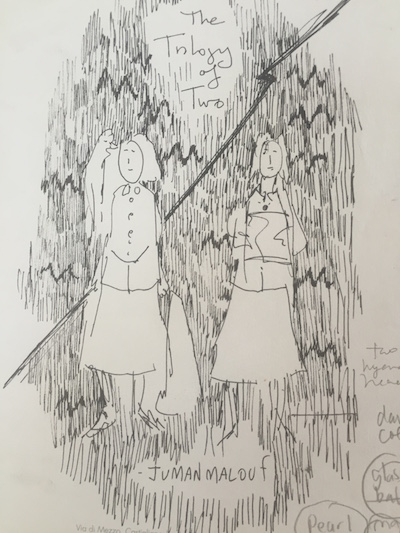For someone whose first novel explores the struggles of twins who don’t fit in, Juman Malouf does an exceptional job of making you feel like you belong. Opening the doors to her New York City apartment, Malouf greets me warmly and leads me through two sets of floor-to-ceiling curtains toward a cozy seating area.
It’s not the first time I’ve been to this talented writer and illustrator’s apartment, but it’s the first time we’ve had the chance to talk one-on-one about her debut novel, The Trilogy of Two. Every time I’ve stepped into her space, a new room has been revealed, another layer peeled back, exposing her wonderful world. For the next hour and a half we talk about passion—finding what you love and feeling appreciative if you’re able to find someone to enjoy it with. (It’s no secret that Malouf’s partner is the brilliant movie director Wes Anderson.)
“I never thought I wanted to write because that’s what my mother did,” says Malouf, daughter of the esteemed novelist Hanan al-Shaykh. “I wanted to do something more visual, but everything I was missing from my previous work in fashion and theater I found in creating a book.”
A coming of age story, The Trilogy of Two takes its cues from Malouf’s own life, but it also references historical and current events ranging from the Industrial Revolution to the ongoing refugee crisis around the world. The plot takes readers on a visual journey through enchanted forests, towering cities, and traveling circus caravans, all seen through the eyes of identical twins, Charlotte and Sonja. Over the course of the book, they hunt for their stolen talents, learning along the way to appreciate their unique place in the world as they slowly uncover the secrets of their past.
Characters like Charlotte and Sonja came to Malouf as flickers of ideas based on her own experiences. The concept of the twins’ amazing aptitude for music, for example, started to form after she watched a friend’s video of a young girl who was a musical prodigy. The idea of stolen talents came when she saw friends from school leaving behind their artistic goals for positions as lawyers or accountants.
“When kids are young, they have these ideas and dreams, and all of a sudden when they grow up, those are all gone and they do something entirely different,” she says. “I was sad to see my friends stop playing music and writing books after graduating.I understand people have to make money, but I also think it’s fear that stops them from doing what they want to do. I never want fear to stop me from doing what I want to do. I don’t have to be the best at something. I just want to do my thing. And if you feel like you don’t have to be the best—that’s helpful, because there is less pressure.”
As we discussed her inspiration, it became evident how great of a role Malouf’s past played in the making of The Trilogy of Two. Malouf was born in Lebanon, living there just a short time before the ongoing civil war forced her mother to move her family to Saudi Arabia. Six years later, Malouf’s family relocated to London, where she attended an American school, struggling to fit in and find her own identity. This part of her childhood greatly inspired the heroines of the story, who feel as though they are outsiders.
Fortunately for Malouf, her mother was already shaping her into the woman she would become, encouraging her to have opinions about a variety of topics from an early age.
“My mom always treated my brother and me like her equals,” she says. “I remember sitting in a dressing room with her when I was seven or eight, listening as she asked my opinion about the clothing she tried on. She was always interested in what I had to say, which is quite powerful.”
Weekend trips to museums solidified her interest in art, which she would eventually study at Brown University and New York University.
“Seeing the paintings and art gave me the same feeling someone gets when they step into their home,” she remembers. “I felt good. I got it. I felt like art was what I wanted to do.”
After a bit of maneuvering through the worlds of theater and fashion, Malouf feels as though she’s finally found her calling as a novelist and illustrator. Part of every day is spent in a fantasy world of writing and drawing. (She did all the wonderful drawings in her book.) She admits to reading more now than she used to, finding that it teaches her how to be a better writer. Whether she is browsing the picture collection at a library looking for photos to add to her piles of research or listening to a book on tape as she sketches, she always seems to be working on something.
“I think humans like to work,” she says, “but they want to find something they really like doing. I think the people who are the happiest are the people that do the things they really like to do. Some people are born and they know what they love at a very young age. For others, it takes a long time to figure it out and some never do. But I think people should try. They should continue to try and find the thing they love.”





